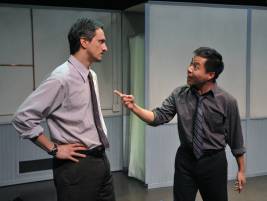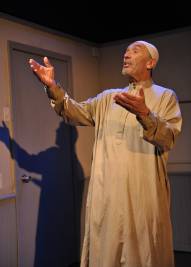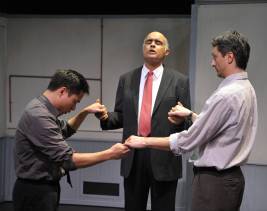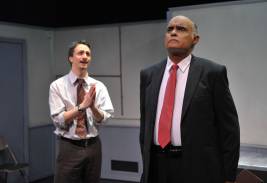
In his dramatic, suspenseful Back Of The Throat, Egyptian-American playwright Yussef El Guindi explored the plight of an Americanized young Arab who finds himself caught in the Hitchockean dilemma of being pursued for a crime he did not commit—in this case, of plotting terrorist acts in a post-9/11 world. By making Khaled an entirely likeable boy-next-door type with an American girlfriend and nary the trace of an Arabic accent, El Guindi got his audience firmly on the side of the accused before starting to plant seeds of doubt in our minds. Might Khaled actually be the terrorist he’s accused of being?
Language Rooms, El Guindi’s latest, takes a more comedic approach to the same post-9/11 world, but one no less powerful for the laughter it provokes, and has been brought down to Los Angeles lock, stock, director, cast, designers, and barrel by San Francisco’s Golden Thread Productions.
 30something Ahmed (James Asher) has been raised by his Egyptian immigrant parents to be as American as apple pie, so much so that he not only looks and sounds like “us,” he has had to learn Arabic on his own, his father having insisted on an English-only upbringing. Still, it is Ahmed’s Arabic language skills that have secured him a job as one of two translators in a government detention center, one whose location remains undisclosed both to us in the audience and to the terrorist suspects being interrogated there.
30something Ahmed (James Asher) has been raised by his Egyptian immigrant parents to be as American as apple pie, so much so that he not only looks and sounds like “us,” he has had to learn Arabic on his own, his father having insisted on an English-only upbringing. Still, it is Ahmed’s Arabic language skills that have secured him a job as one of two translators in a government detention center, one whose location remains undisclosed both to us in the audience and to the terrorist suspects being interrogated there.
Though apparently quite proficient in the tools of the interrogation trade (a bat, honey, pliers, milk, and a dildo among them) and equally adept at worming himself into the confidence of the men he interrogates (and then betray that trust when the time is right), Ahmed has recently come under scrutiny by the higher-ups, or so he learns from his sole Arabic-speaking colleague Nasser (William Dao), presumably of Indonesian or Malaysian descent.
Ahmed is flabbergasted. How could anyone possibly doubt his loyalty and dedication to his job?
When Ahmed’s African-American boss Kevin (Mujahid Abdul-Rashid) enumerates the reasons why his allegiance is being questioned, the Arab-American can hardly believe his ears. Can a dislike for showering with his colleagues, a distaste for sports, and a disinterest in attending the recent Super Bowl party actually add up to suspicion for disloyalty?
Apparently, Ahmed finds out, they can.
 Meanwhile along the way, a series of monologs have introduced us to Samir (Terry Lamb), a middle-aged Egyptian dressed in a traditional gallibaya, who recounts to us in Arabic-accented English his family’s journey from the old country to America in search of a better life.
Meanwhile along the way, a series of monologs have introduced us to Samir (Terry Lamb), a middle-aged Egyptian dressed in a traditional gallibaya, who recounts to us in Arabic-accented English his family’s journey from the old country to America in search of a better life.
It is not until Ahmed’s boss assigns him a task designed to put his loyalty to the test that playwright El Guindi connects Ahmed and Samir’s seemingly unrelated stories in an Act One blackout sure to stimulate much intermission discussion and an eagerness to return for Language Rooms’ edge-of-your-seat Act Two.
Nothing is all-black or all-white in El Guindi’s world. There are no out-and-out heroes or villains, making it all the more difficult to pass judgment or throw stones. Still, it’s hard to leave Language Rooms without feeling that something is very wrong with a world in which the good guys (i.e. us) classify as morally acceptable the kind of “enhanced interrogation techniques” Language Rooms mostly only hints at.
 That El Guindi does this with considerable humor helps make Language Rooms as entertaining as it is compelling and thought-provoking. Lines like “I know we’re of different religions here, so I will refer to a generic god” (spoken by Kevin when inviting Ahmed and Nasser into a pseudo-friendly prayer circle) or “When I accuse a man of treachery, I think we should be on a first name basis” (which is why Ahmed’s boss asks him to call him Kevin, at least for a while) provoke at the very least chuckles, as does Nasser when at one point he asks Ahmed quite casually to “pass the bat and the honey.”
That El Guindi does this with considerable humor helps make Language Rooms as entertaining as it is compelling and thought-provoking. Lines like “I know we’re of different religions here, so I will refer to a generic god” (spoken by Kevin when inviting Ahmed and Nasser into a pseudo-friendly prayer circle) or “When I accuse a man of treachery, I think we should be on a first name basis” (which is why Ahmed’s boss asks him to call him Kevin, at least for a while) provoke at the very least chuckles, as does Nasser when at one point he asks Ahmed quite casually to “pass the bat and the honey.”
Amidst this humor, numerous questions are posed. What does it mean to be “an American” today? Is it possible for first and second generation Americans ever to become completely assimilated and accepted by their adopted country and its citizens? What would it feel like growing up ashamed of your parents’ “otherness”? What must it be like to have seemingly harmless activities appear suspicious simply because of your country and culture of origin?
El Guindi’s Back Of The Throat made its L.A. debut in a sensational from-the-ground-up production at Pasadena’s Furious Theatre Company. Language Rooms is that rarity, an out-of-town production that so impressed critics and audiences that it has been imported to L.A. with its entire creative team intact.
It’s a pleasure to discover director the work of director Evern Odceikin, whose list of San Francisco credits and awards suggests that he is one of the Bay Area’s finest, and it is equally gratifying to watch his expert cast at work.
 A dynamic Dao gives us a man caught between a desire to be true to a colleague and the need not to let that coworker’s possible disloyalty bring him down. Abdul-Rashid is terrific at bringing to life a man whose avuncular affability may not be all that reassuring when you are the one whose work is being questioned. The complexity Lamb gives Samir helps us understand the dilemma of a man wanting to do right by his family even if that might mean hanging himself in the bargain.
A dynamic Dao gives us a man caught between a desire to be true to a colleague and the need not to let that coworker’s possible disloyalty bring him down. Abdul-Rashid is terrific at bringing to life a man whose avuncular affability may not be all that reassuring when you are the one whose work is being questioned. The complexity Lamb gives Samir helps us understand the dilemma of a man wanting to do right by his family even if that might mean hanging himself in the bargain.
Best of all is Asher, whose Ahmed defies easy categorization, forced to prove himself an American for reasons that, if applied to any of us in the mainstream, would seem laughable. The Arab-American actor’s multilayered work starts strong, then grows in power the deeper into quicksand Ahmed sinks.
Language Rooms’ design package is simple but does the trick—Mikiki Uesugi’s cold gray interrogation room, Darl Andrew Packard’s stark lighting, Miyuki Bierlein’s character-appropriate costumes, and Alan Chang’s subtle sound design. Valerie M. Niles deserves many props for her props, particularly those household items of torture. Kudos go also to fight choreographer L. Peter Calendar, production manager Wan-Yin Tang, and technical director Aaron Niles. Pat Loeb is production stage manager, Jesse Brownstein assistant stage manager, and Lannie Gower production assistant.
Language Rooms provides theatergoers a terrific reason to discover the Los Angeles Theater Center, converted from a historic downtown bank, with its expansive, high-ceilinged lobby an ideal location for a pre-show drink or chat (though events like last night’s Downtown LA Art Walk can raise parking to an outrageous $10.) Still, even gouged by Spring Street robbers, I’m glad I got to see a second Yussef El Guindi play—and on a money-saving note, I didn’t have to travel all the way to San Francisco to do so!
The Los Angeles Theatre Center, 514 S. Spring Street, Los Angeles.
www.thelatc.org
–Steven Stanley
June 14, 2012
Photos: David Allen Studio


 Since 2007, Steven Stanley's StageSceneLA.com has spotlighted the best in Southern California theater via reviews, interviews, and its annual StageSceneLA Scenies.
Since 2007, Steven Stanley's StageSceneLA.com has spotlighted the best in Southern California theater via reviews, interviews, and its annual StageSceneLA Scenies.







 COPYRIGHT 2024 STEVEN STANLEY :: DESIGN BY
COPYRIGHT 2024 STEVEN STANLEY :: DESIGN BY